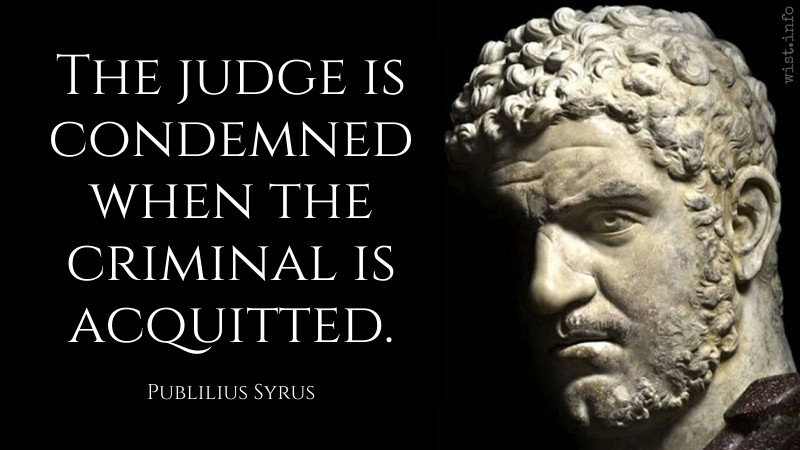You have to believe, by god, that he will be no better in the future after getting this judgment from you and will never stop taking bribes against you if you acquit him.
[οὐ γὰρ δὴ μὰ τὸν Ἡρακλέα βελτίω γενήσεσθαι αὐτὸν προσδοκᾶτε συγγνώμης νυνὶ τυγχάνοντα παρ᾿ ὑμῶν, οὐδὲ τὸ λοιπὸν ἀφέξεσθαι τοῦ λαμβάνειν χρήματα καθ᾿ ὑμῶν, ἐὰν νῦν ἀφῆτε αὐτόν.]
Dinarchus (c. 361-291 BC) Greek orator and speech writer [Dinarch, Deinarchus, Δείναρχος]
“Against Aristogiton”
(Source)
Alt. trans.:
- "Hope not to reform him; for if you pardon him now what assurance have you that he will not against betray your interests in the future?" [tr. Garland (1902)]
- "For you must assume, by Heracles, that there will be no improvement in him if he is pardoned by you now, and that in future he will not abstain from taking bribes against you if you now acquit him." [tr. Burtt (1962)]
Quotations about:
acquittal
Note not all quotations have been tagged, so Search may find additional quotes on this topic.
For your reputation, for your religion, for your safety, for every advantage you have, do not acquit this man — no, exact vengeance upon him to make him an example to everyone, to our citizens and to the rest of the world.
[οὔτε γὰρ πρὸς δόξαν οὔτε πρὸς εὐσέβειαν οὔτε πρὸς ἀσφάλειαν οὔτε πρὸς ἄλλ᾿ οὐδὲν ὑμῖν συμφέρει τοῦτον ἀφεῖναι, ἀλλὰ τιμωρησαμένους παράδειγμα ποιῆσαι πᾶσι, καὶ τοῖς πολίταις καὶ τοῖς ἄλλοις Ἕλλησιν.]
Demosthenes (384-322 BC) Greek orator and statesman
Oration 19, “On the False Embassy,” sec. 343 (Conclusion)
(Source)
Also known as "On the False Legation". Alt. trans.: "For the sake of your honor, of your religion, of your security, of everything you value, you must not acquit this man. Visit him with exemplary punishment, and let his fate be a warning not to our own citizens alone but to every man who lives in the Hellenic world." [tr. Vince, Vince (1926)]
Will you really acquit this damned man who never did you anything good from his first public act but instead has done every evil he could?
[τὸν δὲ κατάρατον τοῦτον, ὃς ἀγαθὸν μὲν ὑμᾶς οὐδεπώποτε πεποίηκεν ἐξ οὗ πρὸς τὴν πόλιν προσελήλυθε, κακὸν δ᾿ ὅ τι δυνατός ἐστιν, ἀφήσετε]
Dinarchus (c. 361-291 BC) Greek orator and speech writer [Dinarch, Deinarchus, Δείναρχος]
“Against Aristogiton”
(Source)
Alt. trans.: "But this accursed wretch has never done you any good since he began his public career, but all the harm he could. Will you then pardon him?" [tr. Garland (1902)]
Alt. trans: "Will you acquit this accursed man who has not done you a service ever since he has been in politics but has been the greatest possible menace?" [tr. Burtt (1962)]
Acquitting the guilty convicts the judge.
[Iudex damnatur cum nocens absolvitur.]
Publilius Syrus (d. 42 BC) Assyrian slave, writer, philosopher [less correctly Publius Syrus]
Sentences [Sententiae], #296
(Source)
Motto of the Edinburgh Review. Alt. trans.:There were multiple collections made of Publilius Syrus' Sententiae in Antiquity and the Middle Ages. This appears in all of them, but often with different line/sentence numbers, incl. #256 and #257.
- "When the guilty man is let off, the judge stands condemned."
- "The judge is condemned when the criminal is acquitted." [tr. Lyman (1856), #868]




